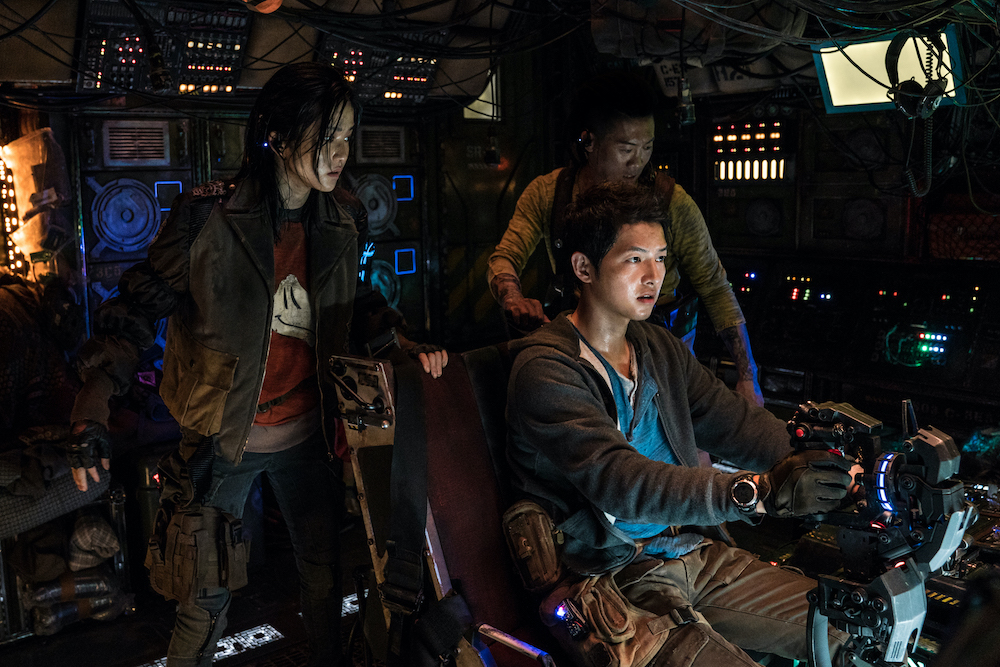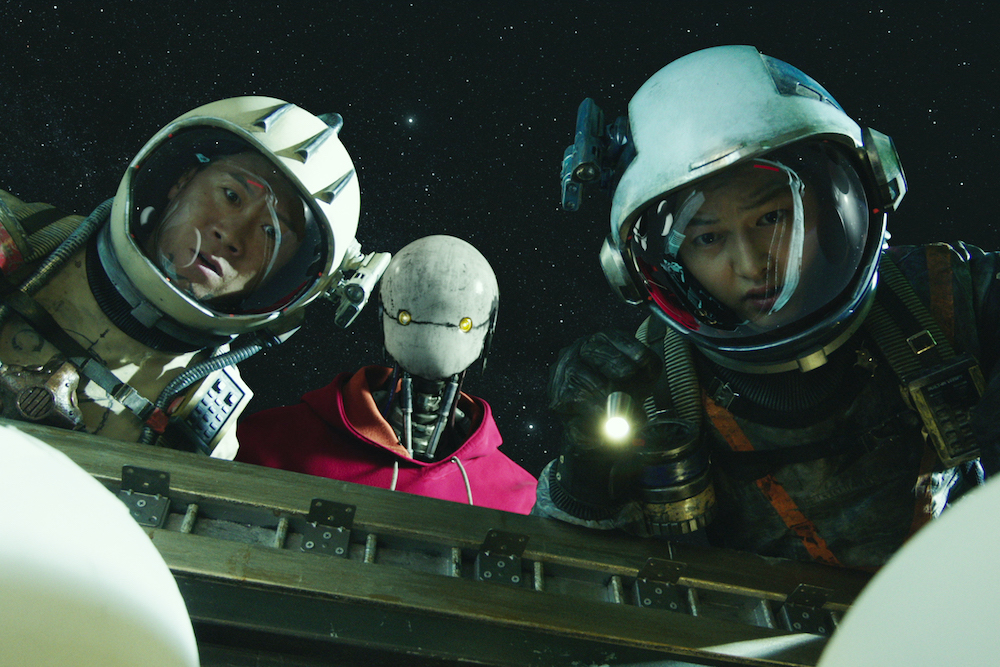
Song Joong-ki, Kim Tae-ri and Jin Seon-kyu in a scene from "Space Sweepers" by director Jo Sung-hee (Netflix)
Don't be deceived by Netflix's pithy tagline: "These misfits just might save the world." Sure, "Space Sweepers" fits in with splashy space romps à la "Guardians of the Galaxy," featuring a ragtag team of losers streaking through the stratosphere to, yes, save the world. But director Jo Sung-hee goes deeper with South Korea's first space blockbuster. Grappling with questions of poverty, classism, environmental justice and empathy, "Space Sweepers" becomes an unlikely (yet effective) avenue for Catholics of the Pope Francis era to reflect on our obligation to "care for our common home" and those who share it.
In the year 2092, Earth is all but uninhabitable. The wealthy elect flock to an idyllic safe-haven in the sky, an orbiting colony under UTS Corporation's control. Meanwhile, the billions of impoverished people struggle to survive on Earth's ravaged surface and clusters of ramshackle space stations. Independent "sweeper" ships race to collect valuable debris floating amid the interplanetary traffic. The fastest and most ruthless is the Korean vessel Victory, whose crew is bound together by necessity more than affection in a bid to make as much money as possible. Part of this crew is pilot Tae-Ho (Song Joong-ki), who is desperately trying to raise funds to track down his missing daughter.
Advertisement
But when Victory comes upon a little girl called Dorothy, a known robot with a weapon of mass destruction hidden inside, their scavenging routine is turned upside-down as each member of the crew must determine what — and who — matters most, to themselves and their dying planet.
Jo brings new life to familiar space-opera motifs that have appeared many times since "Star Wars" practically birthed the genre in 1977, and new faces to still-popular dystopian themes from films like "Elysium" (2013) and "The Hunger Games" saga. Alongside Song, Kim Tae-ri plays the edgy Captain Jang, Jin Seon-kyu sports tattoos and questionably appropriative dreads as Tiger Park, and Yoo Hae-jin lends his voice to the wise-cracking robot Bubs (she/her/hers). The adorable Park Ye-rin steals the show as Dorothy.
It is refreshing to see a space epic not dominated by Americans and Brits (although British actor Richard Armitage plays UTS's sinister CEO, James Sullivan). The world of "Space Sweepers" is multiracial, multicultural, multinational, and vibrantly multilingual. Ubiquitous translator chips allow each character to speak and be understood in their language, an incredible detail making the new space age's diversity feel authentic and culturally rich.
Other choices are less effective. The computer-generated imagery is a bit clunky, the side actors seem strained at best, and the story introduces too many different ideas without fully exploring most of them. Some details are never fully explained (why does Sullivan's skin get all veiny when he's in a murderous mood?). Nonetheless, it has all the ingredients of a satisfying space flick — heart, humor, lovable characters — plus a touch of the prophetic.
"Space Sweepers" strikes a chord for the Catholic viewer in its stark portrayal of a world where the privileged few determine that the majority of humanity — and the entire planet along with it — is disposable. The ruling class of 2092 has gone all-in on "throwaway culture," to use Pope Francis' words, and the chilling reality is that it is only moderately more vicious than our own.
Those who ascend to the UTS safety zone are protected because they are deemed morally superior; everyone else is thrown away to the harsh elements of a plundered planet and demoralized into submission by inflated prices, low-paying jobs and corrupt police. As UTS's dictatorial CEO, Sullivan advances a form of eugenics where one's moral fortitude is genetic, and so society must uplift citizens with better DNA ethics to preserve the future of the human race.

Jin Seon-kyu, Yoo Hai-jin and Song Joong-ki in a scene from "Space Sweepers" by director Jo Sung-hee (Netflix)
There is no grace toward those in the grip of hopelessness, no accounting for the inequities dictating a person's fate, no allowance for redemption. Blinded by privilege (and pain), Sullivan professes an understanding of the universe that Jesus himself vehemently rejected: that the poor and oppressed are to blame for their plight, that God rewards goodness with worldly riches, that health and wealth are signs of favor and moral superiority. In other words, the "prosperity gospel." Capitalism elevated to the heavens.
The separation of rich and poor, worthy and unworthy — the literal elevation of the former and total disregard for the latter — is a version of what we see playing out today, heightened by climate change and the pandemic. The fate of the most vulnerable and exploited is tied to the fate of a vulnerable and exploited planet, while the elite look to a future in the stars, without them.
But in their evolving understanding of Dorothy and her extraordinary gifts (no spoilers!), the intrepid Victory crew finds an antidote to this throwaway culture, the same two-dose protection promised by the Gospels, by "Laudato Si': on Care for Our Common Home" and by revolutionary thinkers across generations: compassion and solidarity. Compassion for the individual, solidarity across communities. When Earth's castaways stop clawing over each other to reach Sullivan's echelon and claim the dignity of their collective strength, they find deliverance for themselves and their planet. Our planet.
"Space Sweepers" is a tale of found family and the miracle of solidarity in a society consumed by disposability. As in all the best sci-fi: Come for the spaceships, stay for the relationships.








